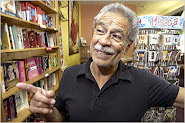
Division of Bicultural-Bilingual Studies
University of Texas at San Antonio
http://www.legalfoundation.org/2005/JoshAlex-Avila-Intro.htm
“Joaquin Avila grew up in Compton, California. He graduated as valedictorian from Centennial High School. After graduating he went on to Yale. Following Yale, Joaquin went on to Harvard Law School, where he served as Comments and Case editor on the Harvard Civil Rights Law Review. He graduated in 1973 and went on to clerk on the Alaska Supreme Court. Joaquin followed his passion to the Mexican American Legal Defense and Education Fund, MALDEF, the preeminent Latino civil rights organization. He became General Counsel in 1982. While at MALDEF, Professor Avila formulated and implemented a national Latino civil rights agenda. Professor Avila has received numerous awards and accolades throughout his distinguished career, including the California State Bar Loren Miller Legal Services Award, the MacArthur Fellowship (1996), and the Benito Juarez award from the Hispanic National Bar Association.”

Lesson Plan Title
Chicano/a Civil Rights: Understanding the Fight for Political Equity
Learning Level
Grade level 11-12
TEKS Standards
113.32 United States History Studies Since Reconstruction (One Credit): (18) Citizenship: The student understands efforts to expand the democratic process. The student is expected to: (A) Identify and analyze methods of expanding the right to participate in the democratic process, including lobbying, protesting, court decisions, and amendments to the U.S. constitution. (C) Explain how participation in the democratic process reflects our national identity.
Pre-Instruction or Prerequisite Knowledge/Skills
· Basic Internet search capabilities and basic writing skills.
· Components of a research paper.
Lesson Duration
4 sessions, 2 hours each
Learning Location
Computer Lab, online, and in classroom
Materials
· Computers with Internet connection
· PBS Documentary-Chicano! Episode 4: Fighting For Political Power
· Printer/paper
Learning Objectives
· Students will watch the PBS documentary Chicano! Episode 4 and discuss the Chicano/a Movement.
· Students will be able to write a research paper about Joaquin Avila, MALDEF, the Chicano Movement, and voting rights.
· Students will be able to type their essay and print a copy of the essay.
1.) Teacher will present a lecture about the meaning of the cultural and political term “Chicano/a”:
http://en.wikipedia.org/wiki/Chicano
2.) Teacher will present about Joaquin Avila and his work.
http://www.albany.edu/jmmh/vol3/chicano/chicano.html
4.) Students will watch the documentary, Chicano! Episode 4: Fighting For Political
Power.
 5.) Teacher will discuss the following questions with students:
5.) Teacher will discuss the following questions with students:
-What does the word “Chicano/a” mean?
-What political struggles were seen in the film?
-Do you think that Chicano/as, Latino/as, Mexicans, Mexican Americans are still fighting for political equity?
6.) Students will use the internet to search for information on voting rights:
http://en.wikipedia.org/wiki/Voting_rights_in_the_United_States
7.) Students will create a timeline about voting rights:
http://www.readwritethink.org/student_mat/student_material.asp?id=7
http://www.readwritethink.org/materials/timeline/
8.) Students will use the internet to search for information on MALDEF and voting
rights:
http://www.maldef.org/immigration/index.htm
9.) Using the attached sheet, students must write notes. They are not allowed to print
every page they find on their topic.
10.) Once research is completed, direct students to develop an outline (give instruction if
needed) on their topic.
11.) Once outlines are complete, ask students to develop paragraphs for each section of
the outline.
12.) When every paragraph is complete, ask students to develop a complete rough draft
of the entire paper.
13.) Working in groups (no more than four students per group), students will then
proofread their papers. They may ask opinions from the instructor.
14.) After a final draft is complete, students will be asked to give their paper a title and
type the paper in a word processing program.
15.) Once the paper is complete, ask students to print a copy for review (Some instruction
may be needed at this point). The end product should be a well-organized and flowing description of their topic.
16.) Students will work in groups (3-4 students) and read final drafts.
-Who is the policy aimed at?
-Who made the rule?
-Why was the rule needed?
-Is it still needed?
-Is there an alternative rule that would be or could be more effective?
18.) Students will propose a school policy and investigate how to implement it (e.g. school board, Student Council, PTA).
19.) Students will present (5-10 minutes) their findings in classroom.
20.) Students will reflect on:
-Concepts learned
-Implications of voting rights for Chicano/as
-The process of implementing and voting on school policy
Evaluation
The instructor may write their own rubric for grading purposes.
Resources
http://www.legalfoundation.org/2005/JoshAlex-Avila-Intro.htm http://en.wikipedia.org/wiki/Chicano
http://www.metnews.com/articles/avil0821.htm http://news-service.stanford.edu/news/1997/april9/avila.html
http://www.albany.edu/jmmh/vol3/chicano/chicano.html http://en.wikipedia.org/wiki/Voting_rights_in_the_United_States
http://www.readwritethink.org/student_mat/student_material.asp?id=7 http://www.readwritethink.org/materials/timeline/
http://www.maldef.org/immigration/index.htm






No comments:
Post a Comment